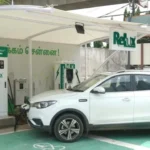Electric vehicle owners in Bengaluru have cause for celebration as the city gears up to welcome an extensive network of public charging stations.
According to recent reports, the Bangalore Electricity Supply Company Limited (BESCOM) has entrusted Reliance BP Mobility Limited with the task of setting up 225 public charging stations throughout Bengaluru. Among these, 150 stations will be situated within Bengaluru city limits, with the remaining 75 allocated to Bengaluru rural areas.
A senior official from BESCOM disclosed, “We awarded the charging infrastructure tender to Reliance BP Mobility Limited in October. They have committed to establishing 150 charging stations in Bengaluru city and 75 in Bengaluru rural areas.” Currently, a comprehensive survey is underway to identify suitable land for the infrastructure’s installation. Upon completion of the survey, Reliance BP will enter into a decade-long lease agreement with the respective landholding agencies. The bidding for charging services is set at INR 2.19 per unit.
The estimated cost of setting up an EV charging station in Bengaluru ranges from INR 35-40 lakh, as per recent assessments.
Meanwhile, BESCOM plans to roll out 1,190 EV charging stations across Karnataka through a public-private partnership (PPP) model. These stations will feature a combination of AC and DC chargers, totaling 1,190 AC chargers alongside an equal number of DC chargers. Most of these stations are earmarked for government-owned properties.
In adherence to central government directives, nodal agencies are mandated to remunerate a minimum of Re 1 per unit for charging services. BESCOM has awarded tenders to bidders surpassing this rate. Each charging station will host 10 KW AC 001 chargers, 7.5 KW type 2 chargers, and 60 KW CCS2 chargers, enabling the simultaneous charging of two vehicles.
The selection between the 10 KW AC 001 charger and the 7.5 KW type 2 charger will be contingent on site-specific requirements. While BESCOM levies INR 7.38 per unit for charging services, Reliance imposes a tariff of INR 15.99 per unit in other regions. A spokesperson clarified that Reliance’s higher tariff aims to ensure profitability and offset the substantial investments involved in setting up these stations.
As of February 15, 2024, Karnataka leads the nation in EV charging infrastructure, boasting a total of 5,059 charging stations. Maharashtra follows suit with 3,079 stations, while Delhi secures the third position with 1,886 stations. These advancements underscore India’s concerted efforts towards fostering a robust EV charging network, promoting widespread adoption of electric vehicles, and mitigating carbon emissions.






